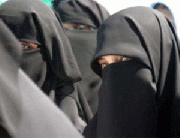The American Civil Liberties Union of Michigan, with the support of a diverse group of religious, ethnic and domestic violence organizations, submitted a comment this week to the Michigan Supreme Court asking the court to change a proposed court rule that would effectively close the courthouse doors to Muslim women who wear a niqab, a veil which covers the lower part of the face.

We agree this proposed rule would discriminate against Muslim women who choose to wear the niqab and should be changed.
“Judges should not deny anyone access to justice because of his or her religion,” said Michael J. Steinberg, ACLU of Michigan legal director. “Under the proposed rule, women who were sexually assaulted could not have their day in court without abandoning their religious beliefs. We have come too far as a country to now shut the courtroom doors on women because of their religious clothing.”
The rule of evidence was proposed in response to a lawsuit challenging a Hamtramck District Court judge’s decision to dismiss a small claims dispute after the plaintiff refused to remove her niqab. The rule authorizes judges to “control the appearance” of parties and witnesses and is intended to permit judges to bar Muslim women who wear a niqab from participating in the court proceedings unless they choose to abandon their religious beliefs.
In its comment, the ACLU and other groups warn that the court rule threatens to unconstitutionally deny individuals their fundamental right of access to the courts based on their religious beliefs. The groups ask the Supreme Court to add a sentence to the rule ensuring “that no person shall be precluded from testifying on the basis of clothing worn because of a sincerely held religious belief. ”
The comment provides numerous examples of judges and juries determining the credibility of witnesses without seeing their facial expressions, including when the judge is blind, when witnesses with disabilities do not have control of their facial movements and when the former testimony of an unavailable witness is simply read to the jury by a third person. Given these examples, the comment states, “there is no reason why a woman in a niqab should be treated any differently.”
The comment also cites numerous studies finding that, contrary to popular belief, individuals are generally better able to determine the credibility of a witness by only listening to their testimony as opposed to watching the witness and listening to their testimony.
The comment was submitted by the ACLU of Michigan and signed by a wide range of Christian, Jewish and Muslim organizations, domestic violence groups, and organizations and professionals who serve women who wear niqab. The religious organizations include: the Baptist Joint Committee for Religious Liberty, the American Jewish Congress, the Michigan Conference of the United Church of Christ, the Jewish Council for Public Affairs and the Council on American-Islamic Relations (Michigan). The domestic violence organizations include: First Step, the Michigan Coalition Against Domestic and Sexual Violence, SafeHouse Center and Turning Point. The social services organizations and professionals include: the American-Arab Anti-Discrimination Committee of Michigan, the Arab Community Center for Economic and Social Services, Legal Services of South Central Michigan, Professor Douglas Laycock, Professor Ashley Lowe, KARAMAH, the Michigan Immigrant Rights Project and the Michigan Poverty Law Project.
We hope the high court in Michigan will ensure the rights of everyone to due process.






Leave a Reply